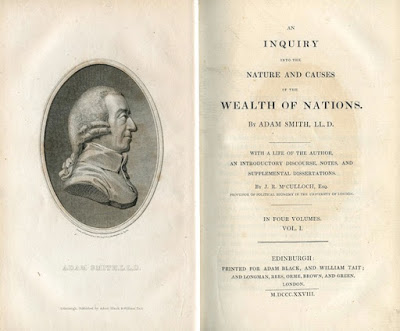Last month Keynes' General Theory was 80. Today Adam Smith's Wealth of Nations turns 240 (h/t Paulo Gala)! Below the often misunderstood quote on the notorious invisible hand. He says: "As every individual, therefore, endeavours as much as he can both to employ his capital in the support of domestic industry, and so to direct that industry that its produce may be of the greatest value; every individual necessarily labours to render the annual revenue of the society as great as he can. He generally, indeed, neither intends to promote the public interest, nor knows how much he is promoting it. By preferring the support of domestic to that of foreign industry, he intends only his own security; and by directing that industry in such a manner as its produce may be of the greatest value, he intends only his own gain, and he is in this, as in many other cases, led by an invisible hand to promote an end which was no part of his intention. Nor is it always the worse for the society that it was no part of it. By pursuing his own interest he frequently promotes that of the society more effectually than when he really intends to promote it. I have never known much good done by those who affected to trade for the public good. It is an affectation, indeed, not very common among merchants, and very few words need be employed in dissuading them from it.
Topics:
Matias Vernengo considers the following as important: Adam Smith, invisible hand, Wealth of Nations
This could be interesting, too:
Angry Bear writes “The Many Faces of Adam Smith”
Matias Vernengo writes What’s the deal with The Smiths
Matias Vernengo writes Classical Political Economy or the Surplus Approach
Matias Vernengo writes The worldly philosophers go to Washington: Episode 3, Farmer and Merchants
Note that the quote is related to international trade, and the fact that those that buy domestic rather than foreign products help the local economy, even if that is not their direct intent."As every individual, therefore, endeavours as much as he can both to employ his capital in the support of domestic industry, and so to direct that industry that its produce may be of the greatest value; every individual necessarily labours to render the annual revenue of the society as great as he can. He generally, indeed, neither intends to promote the public interest, nor knows how much he is promoting it. By preferring the support of domestic to that of foreign industry, he intends only his own security; and by directing that industry in such a manner as its produce may be of the greatest value, he intends only his own gain, and he is in this, as in many other cases, led by an invisible hand to promote an end which was no part of his intention. Nor is it always the worse for the society that it was no part of it. By pursuing his own interest he frequently promotes that of the society more effectually than when he really intends to promote it. I have never known much good done by those who affected to trade for the public good. It is an affectation, indeed, not very common among merchants, and very few words need be employed in dissuading them from it." [9th paragraph, in chapter 2 of book IV; full chapter here]

